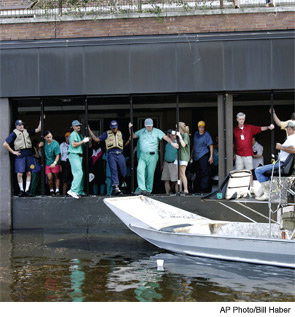
Explore This Issue
February 2012MIAMI BEACH — Anna M. Pou, MD, the Louisiana State University professor of otorhinolaryngology who found herself at the center of the debate over disaster medical care following her work after Hurricane Katrina, told colleagues here on Jan. 28 that disaster could strike anywhere, anytime and that the only way to protect themselves and their patients is to plan now.
Dr. Pou was working at Memorial Medical Center in New Orleans when the levies broke after Katrina, allowing water to engulf the city. There were 2,000 people at the hospital, including patients, hospital staff, their family members, even their pets, when the lights and power went out, sewage overflowed, food and water ran short and temperatures rose to more than 100 degrees.
With rescue efforts scant, hospital staffers were faced with brutal ethical decisions on whom to evacuate, how to treat the rest and how to distribute supplies. Later, the Louisiana Attorney General accused Dr. Pou of injecting patients at Memorial Medical Center with a lethal combination of drugs. In 2007, a grand jury ruled not to indict her.
It’s not a situation she’d want anyone else to suffer through, Dr. Pou said. So she implored the audience at the Triological Society Combined Sections Meeting to think ahead.
“Are you really up to this?” Dr. Pou said. “Planning is imperative. No, it won’t be perfect. Yes, you’ll have to change it. You’ll have to critically think on your feet. But physicians should never be put in a situation of being in a disaster, as we were in New Orleans, with no plan. The better you prepare, the less ethical dilemmas.”
The Federal Emergency Management Agency suggested that the hospitals be self-sufficient for five to 10 days, but the generators were in the basement and they were rendered useless by the flooding.
Since her ordeal, Dr. Pou has spoken out about the need for better disaster planning by the medical community and helped push through legislation in Louisiana giving doctors more protection when they provide care in disaster settings. She said doctors would benefit from military training and suggested that mental health experts should be on hand to help people get through the mental strain of disasters. She also said a legal standard of care and nationwide triage rules are needed.
Tough Decisions
Dr. Pou’s ordeal still seemed fresh as she spoke. On the roof of the hospital, a helicopter dropped down to pick up patients, waiting with family members who wanted to be evacuated with them. Some of them were elderly couples who were separated from each other. Dr. Pou and others feared that they would not survive the ordeal and would never see each other again. Doctors even begged for their patients to be evacuated, saying, “Please let them go first,” Dr. Pou recalled.
Leave a Reply